Mothers and fathers in the United States approach parenting differently in many ways, from how they relate to their children to the worries they have about challenges their children may face, to the role being a parent plays in their lives.
Far larger shares of mothers than fathers say they are extremely or very worried that their children might experience mental health challenges or bullying and certain threats to their physical safety. Moms are also more likely than dads to say being a parent is stressful and tiring all or most of the time. And they’re generally more likely than fathers to say they feel judged for how they parent their children.
Moms and dads differ in their approach to parenting
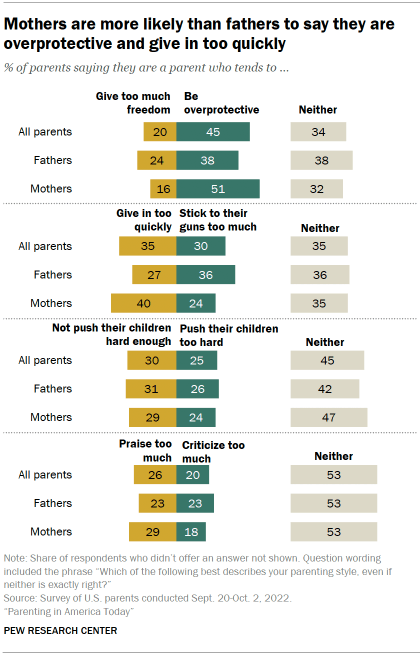
Mothers are far more likely than fathers to describe themselves as overprotective and to say they give in to their children too quickly.
Among parents of children younger than 18, about half of mothers (51%) say they are the type of parent who tends to be overprotective, compared with 38% of fathers. On the flip side, fathers are more likely than mothers to say they tend to give too much freedom (24% vs. 16%). Similarly, mothers (40%) are more likely than fathers (27%) to say they give in too quickly, while fathers are more likely than mothers to say they stick to their guns too much (36% vs. 24%).
There are more modest differences when it comes to how much praise or criticism parents offer: 23% of fathers (vs. 18% of mothers) say they criticize their children too much, while 29% of moms (vs. 23% of dads) say they praise them too much. There are no significant differences between mothers and fathers on whether they push their children too hard or not hard enough, but mothers are slightly more likely than fathers to say neither of those fits their parenting style.
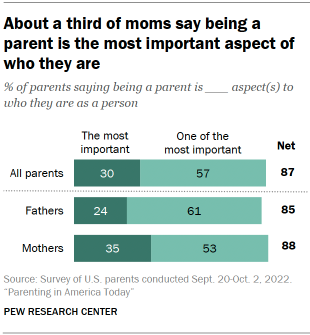
Mothers (48%) are more likely than fathers (40%) to say they are trying to raise their children in a very or somewhat different way compared with how they were raised. In turn, fathers are more likely than mothers to say they’re raising their kids very or somewhat similarly to how they were raised (47% vs. 40%, respectively).
(For more on the ways in which parents are trying to raise their children in a similar or different way to how they were raised, see How Today’s Parents Say Their Approach to Parenting Does – or Doesn’t –Match Their Own Upbringing.)
There are also differences in how mothers and fathers see the importance of being a parent to their overall sense of identity. While the vast majority of mothers and fathers (88% and 85%, respectively) say being a parent is the most or one of the most important aspects of who they are as a person, a larger share of moms (35%) than dads (24%) say it is the most important aspect.
Moms, more than dads, say parenting is tiring and stressful and that they feel judged by certain groups for how they parent
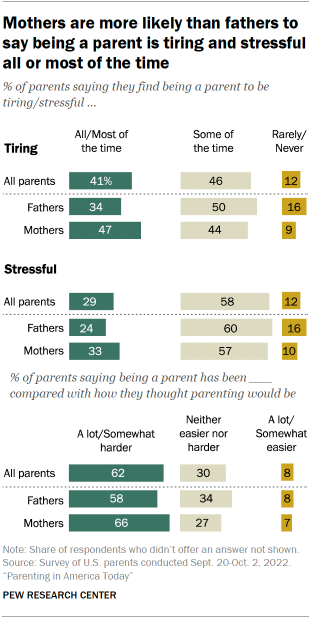
Majorities of mothers (66%) and fathers (58%) say parenting is a lot or somewhat harder than they thought it would be, but mothers are more likely to say this, with a difference of 10 percentage points in the shares of mothers and fathers saying it has been a lot harder (30% vs. 20%, respectively).
Mothers are also more likely than fathers to say being a parent is tiring (47% vs. 34%) and stressful (33% vs. 24%) all or most of the time. Still, large majorities of moms – and dads – say they find parenting to be enjoyable and rewarding (shares ranging from 79% to 83% say this is the case all or most of the time).
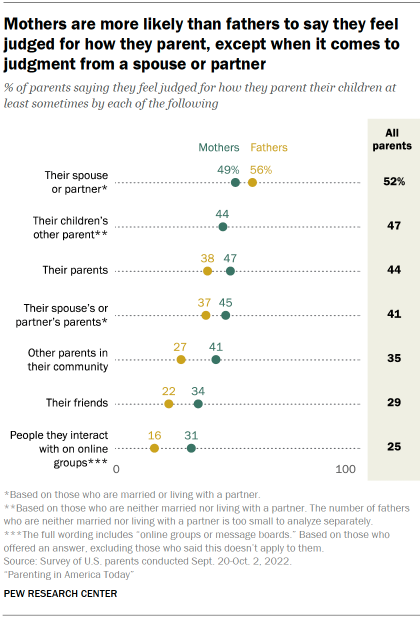
Parenting can also come with judgment, and mothers tend to feel this more than fathers. In particular, mothers are more likely than fathers to say they feel judged at least sometimes by their own parents (47% vs. 38%) and their spouse or partner’s parents (45% vs. 37% among those who are married or living with a partner) for how they parent their children. There are also double-digit differences between mothers and fathers in the shares who say they feel judged at least sometimes by other parents in their community (41% vs. 27%), their friends (34% vs. 22%) and people they interact with on online groups or message boards (31% vs. 16%, among those who offered an answer, excluding those who said this didn’t apply).
For their part, fathers are more likely than mothers to say they feel judged by their spouse or partner at least sometimes for how they parent their children (56% vs. 49% among those who are married or living with a partner).
Moms worry more than dads about a host of issues
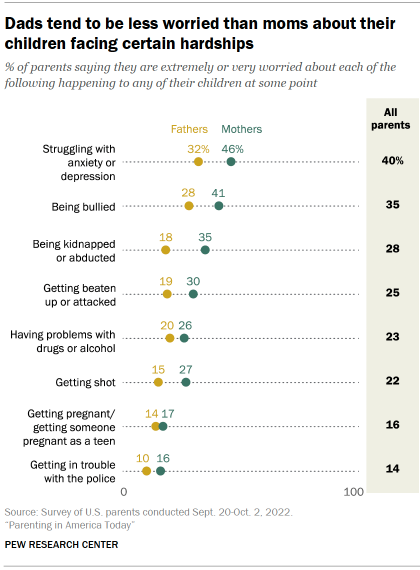
Nearly half of mothers (46%) say they are extremely or very worried their children will struggle with anxiety or depression at some point, compared with 32% of fathers. And, by double-digit margins, mothers are also more likely than fathers to say they are extremely or very worried about their children being bullied, being kidnapped or abducted, getting beaten up and getting shot. Moms are also more likely to express concerns about their children having problems with drugs or alcohol and getting in trouble with the police.
Mothers across racial and ethnic groups are generally more likely than their male counterparts to say they are extremely or very worried about their children facing certain hardships, but Hispanic mothers are especially worried. In fact, Hispanic mothers are more likely than White, Black or Asian mothers to say they are extremely or very worried their children might face most of the experiences asked in the survey. There are no consistent patterns in concerns among fathers across racial or ethnic groups. (For more on how parental concerns differ by race and ethnicity, see Chapter 2.)
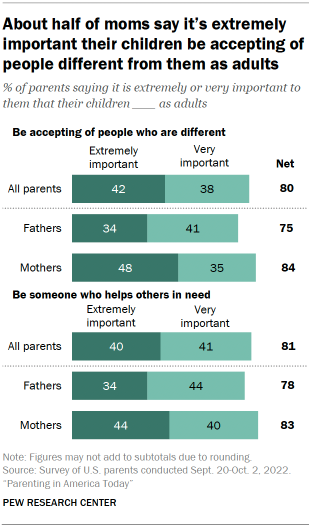
Mothers and fathers are more in alignment when it comes to the aspirations and goals for their children, with similar shares saying it’s extremely or very important to them that their children be honest and ethical (95% and 93%, respectively), hardworking (90% and 87%), and ambitious (66% and 64%) as adults. Mothers and fathers also give similar answers when it comes to their children earning a college degree – 41% of moms and dads each say this is extremely or very important to them.
But there are some differences. Mothers are more likely than fathers to say it’s extremely important to them that their children grow up to be accepting of people who are different from them and to be someone who helps others in need. For their part, fathers are more likely than mothers to say it’s extremely or very important to them that their children get married (25% vs. 18% of moms) and have children (24% vs. 17%), although relatively small shares of both place great importance on either of these family milestones.
Moms and dads have different perceptions of how child care tasks are divided
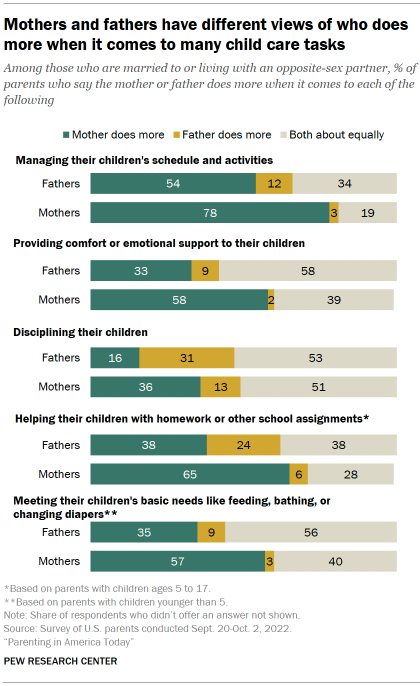
Consistent with past surveys, perceptions of who does more when it comes to child care responsibilities differ by gender among married and cohabiting parents in opposite-sex relationships.2 Mothers tend to say they do more than their spouse or partner, while fathers tend to say they share responsibilities about equally.
Majorities of mothers say they do more than their spouse or partner when it comes to managing their children’s schedule and activities (78% say they do more of this), helping their children with homework or other school assignments (65% among those with school-age children), providing comfort or emotional support to their children (58%), and meeting their children’s basic needs, such as feeding, bathing or changing diapers (57% among those with children younger than 5). On each of these, fathers are more likely than mothers to say they do more or that they share these responsibilities about equally with their spouse or partner. Still, with the exception of helping their children with homework, only about one-in-ten fathers say they do more than their spouse or partner when it comes to these tasks.
When it comes to disciplining their children, similar shares of mothers (53%) and fathers (51%) say they share this responsibility with their spouse or partner about equally, but while 36% of mothers say they do more, just 16% of fathers say their spouse or partner does more in this regard. In turn, 31% of fathers say they do more disciplining than their spouse or partner, compared with 13% of mothers who say their spouse or partner does more than they do.
Mothers who say they do more than their spouse or partner when it comes to managing their children’s schedules and activities and providing comfort or emotional support are more likely than those who say both parents share these responsibilities about equally to say parenting has been harder than they expected. About seven-in-ten mothers who say they do more when it comes to managing their children’s schedules and activities (71%) and providing comfort or emotional support (72%) say being a parent has been at least somewhat harder than they expected, compared with 54% and 59%, respectively, among mothers who say they share these responsibilities about equally with their spouse or partner.
Previous research has found that working mothers are more likely to carry more of the household and caregiving load, and many of the duties mothers take on in family life were made even more difficult in the COVID-19 pandemic.


 How Today’s Parents Say Their Approach to Parenting Does – or Doesn’t – Match Their Own Upbringing
How Today’s Parents Say Their Approach to Parenting Does – or Doesn’t – Match Their Own Upbringing